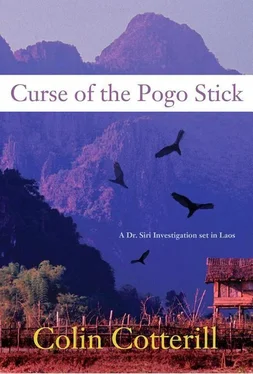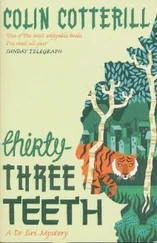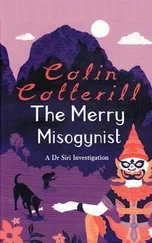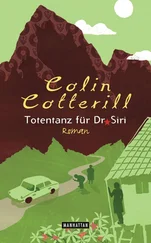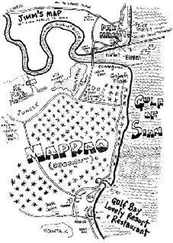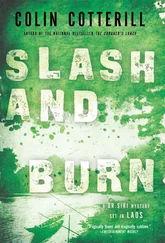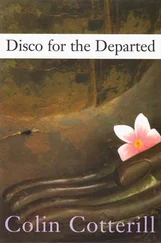Colin Cotterill - Curse of the Pogo Stick
Здесь есть возможность читать онлайн «Colin Cotterill - Curse of the Pogo Stick» весь текст электронной книги совершенно бесплатно (целиком полную версию без сокращений). В некоторых случаях можно слушать аудио, скачать через торрент в формате fb2 и присутствует краткое содержание. Жанр: Криминальный детектив, на английском языке. Описание произведения, (предисловие) а так же отзывы посетителей доступны на портале библиотеки ЛибКат.
- Название:Curse of the Pogo Stick
- Автор:
- Жанр:
- Год:неизвестен
- ISBN:нет данных
- Рейтинг книги:5 / 5. Голосов: 1
-
Избранное:Добавить в избранное
- Отзывы:
-
Ваша оценка:
- 100
- 1
- 2
- 3
- 4
- 5
Curse of the Pogo Stick: краткое содержание, описание и аннотация
Предлагаем к чтению аннотацию, описание, краткое содержание или предисловие (зависит от того, что написал сам автор книги «Curse of the Pogo Stick»). Если вы не нашли необходимую информацию о книге — напишите в комментариях, мы постараемся отыскать её.
Curse of the Pogo Stick — читать онлайн бесплатно полную книгу (весь текст) целиком
Ниже представлен текст книги, разбитый по страницам. Система сохранения места последней прочитанной страницы, позволяет с удобством читать онлайн бесплатно книгу «Curse of the Pogo Stick», без необходимости каждый раз заново искать на чём Вы остановились. Поставьте закладку, и сможете в любой момент перейти на страницу, на которой закончили чтение.
Интервал:
Закладка:
With that bafflingly cruel aphorism still in his head, Siri had cornered Phosy, his favorite policeman and surrogate son-in-law. He’d begged the officer to accompany him on the trek.
“I need a human being to talk to,” he’d pleaded. But Phosy was assigned to bigger cheeses than Dr. Siri and there was nothing he could do about it. Siri was on his own.
Despite the fact that their mission was supposed to instill confidence in the beleaguered law enforcement officers of Xiang Khouang, the only professional stop they made that first day was at a little police box in Ban Latngon. The officer wasn’t in attendance but they knew he couldn’t be far because his uniform and underwear were drying on a string line beside it. As they sat waiting for his return, Siri could hear the secret language of the geng wafting down from the hills. And some of the sounds were taking on the form of words to him. He was certain he heard the name of his inner shaman, Yeh Ming, and something about a young girl and a demon. But the words were often lost in the notes like a puzzle and when he looked around at the other members of his party, it occurred to him he was the only one paying attention to the music. He wondered whether anyone else could even hear it.
After half an hour they gave up on the errant policeman and left him a note before resuming their journey. As Siri had feared, Haeng wasn’t the type of passenger who sits staring idly at the passing scenery. He’d had many years of experience of pummeling people into submission with his points of view. Along the way he’d memorized a thousand Party slogans and made up a thousand more. He was the type who never asked a question that warranted more than a yes or no reply, so when they first stopped to shoot rabbits-the polite man’s euphemism for having a wee-Siri had found himself a painful lip bush. The leaves were spongy and surprisingly sound resistant. He’d used them during the war to block out the headache of constant mortar fire. He assumed that if they were able to deaden the percussion of battle they should be more than adequate to erase the inane chatter of Judge Haeng. All Siri needed to do was nod or shake his head from time to time and his superior was satisfied.
Cloaked in this new peace, Siri took in the spectacular scenery. He’d lived in it, of course, but in war one never had the luxury of appreciating the beauty of nature. Every hill, every mountain had been a threat then. But in the slow-moving convoy that took them through Latngon and further west toward Kasong, he had the time and space to enjoy his splendid country. Every turn in the road revealed a new calendar photograph. The mountains rose from misty valleys like Chinese watercolors. It was the land of birds, of jungle sounds, and of lushly delicious vegetation. He was delighted that the fighting hadn’t destroyed it all. Thankfully, Mother Nature always managed to find a way of repairing man’s abuse of her. And no more than twelve kilometers from Ban Kasong she even began to stamp her authority.
The rains had long since ceased in the northeast but the road had yet to recover from them. The ruts in the dirt track they called a highway were deep and crested as if a choppy sea had been carved out of dry mud. In places there was nothing flat to drive on at all. The soldiers in the lead car would jump from their vehicle with spades and attempt to level a way through the clay breakers. They were barely thirty kilometers from Phonsavan when the captain in charge-the setting sun already turning him into a silhouette-summoned the men to pitch their tents and call it a day.
Siri unplugged the leaves from his ears and smiled at Judge Haeng.
“Not bad,” he said. “Thirty kilometers already. At this rate you’ll be my age by the time we get to Luang Prabang.”
“Yes, Doctor?” said Haeng. “And where will that leave you?”
“In a far better place, Judge.”
In the jungles of Xiang Khouang there were wild tigers, Malay bears, and wolves. Very few of them lusted for human flesh but the ominous night chorus they broadcast would leave a young city boy with fears for his life. Although Haeng had grown up in the northeast he wasn’t the hardy, outdoors type. The son of an affluent Chinese businessman who chose his allies well, Haeng had been a child of the Party, a red scarf-wearing zealot, the type who gladly informed on his schoolmates. While his father was trafficking arms in one direction and opium in the other, Haeng’s Lao mother had nurtured in her son a sense of fair play and equality, but as in most privileged upbringings, equality didn’t amount to giving away their wealth and sharing what they had with the lower classes. This dichotomy had continued to confuse young Haeng even when his father decided the time was ripe to send his eldest son to study in the Eastern Bloc. A second boy was sent to China and a third to Australia to hedge all bets. One could never tell in which direction the political winds would blow in the region.
Even in Laos the businessman had been canny. Unbeknownst to the Pathet Lao, the astute Chinese had played both sides right up until the cease-fire in ‘73. When it became clear the Royalists were unlikely to triumph, he focused his allegiance and large sums of money on the communists. By then the ideological investment he’d made in his first son was reaping dividends. Haeng was already a senior Party Youth cadre in the Soviet Union and had done well in school. He’d studied law to a level students from the third world were permitted to reach and it seemed plausible the boy would soon be able to return to Laos in some senior management position. But his father wanted more. It took a generous contribution to the Soviet Ministry of Justice to persuade them that an expeditious course in advanced law for Indochinese students would be invaluable to his son. So, in nine months, a second-class law degree that carried no weight in the USSR was upgraded to a judgeship in Laos, which had even less meaning.
While his fellow Party members had lived in caves for a generation, Haeng had managed to completely avoid fighting and roughing it in the jungle. In fact, hard as it might be to believe, he’d lived something of a playboy lifestyle in Moscow. Even in the sixties there was fun to be had in the Soviet Union for the children of the Marxist capitalists. He had lived well there and returned reluctantly to Laos to take over a justice system vacated by the fleeing Royalists. There was no longer a constitution, which meant there were no laws, so his role was largely ornamental. Other than trying the odd divorce, frolicking with cheap and easy nightclub singers, and drinking the nights away, he had little to busy himself with.
But there was plenty to occupy his mind on this first night of their road trip. He lay wide awake in his tent as the light from the fire danced its fingers against the canvas. The ground was hard and lumpy. The air was so cold he could see his breath. And, all around, wild beasts reminded him that he was invading their territory. He hated the prime minister’s office for ordering this tour but he knew these were early days in his climb to power. He was an outsider in this bureaucracy of old men and, as such, wasn’t particularly trusted by any of them. He had a good deal of favor currying to do before they’d accept him into their inner circle. And one thing Judge Haeng was good at, one might even say virtuoso, was kissing arse.
December in the mountains of Xiang Khouang was too cold and high for mosquitoes. Siri slept in a hammock slung between two sturdy drooping breast fruit trees. Wrapped in a blanket, he smiled up at the stars that extended from horizon to horizon. They shone brightly like sunlight squeezing in through nail holes in the atmosphere. He breathed in the scents: the night orchids that hid their beauty shyly during the day and blossomed under moonlight, the release sourness plants, and the sudden love vegetables. He listened to the jungle musical: the choir of birds and beasts that sang through the night. The air was so fresh he could feel his insides waking from a long polluted hibernation.
Читать дальшеИнтервал:
Закладка:
Похожие книги на «Curse of the Pogo Stick»
Представляем Вашему вниманию похожие книги на «Curse of the Pogo Stick» списком для выбора. Мы отобрали схожую по названию и смыслу литературу в надежде предоставить читателям больше вариантов отыскать новые, интересные, ещё непрочитанные произведения.
Обсуждение, отзывы о книге «Curse of the Pogo Stick» и просто собственные мнения читателей. Оставьте ваши комментарии, напишите, что Вы думаете о произведении, его смысле или главных героях. Укажите что конкретно понравилось, а что нет, и почему Вы так считаете.
